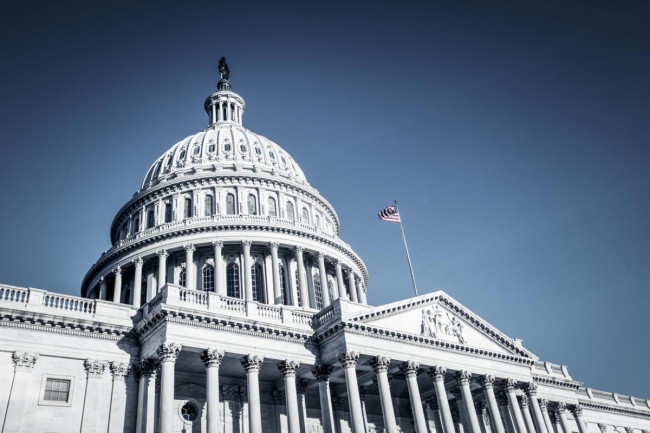You have /5 articles left.
Sign up for a free account or log in.

istock.com/uschools
Two weeks ago, Senator Lamar Alexander, a Republican from Tennessee, said he spoke to about 90 college and university presidents in his state about reopening campuses this fall. All of them asked if Congress would protect their institutions from coronavirus-related lawsuits if they’d taken reasonable precautions but a student got sick anyway, he said.
Alexander, the influential chairman of the Senate education committee and himself the former president of the University of Tennessee, told reporters it was important to protect colleges from being sued if they acted responsibly.
“Schools and businesses will be less likely to reopen if they think they’ll be sued if someone gets sick,” he said in a call with reporters, “particularly if they follow reasonable practices and still get sued.”
As Inside Higher Ed first reported, colleges and universities have been telling Congress, and Vice President Mike Pence in a meeting two weeks ago, that those who act irresponsibly should still face the threat of lawsuits. But those who take reasonable precautions shouldn’t have to worry about getting sued, many in the industry have said.
But even those backing the idea acknowledge it raises a difficult question when schools, businesses and society are still struggling with how to contain the pandemic. What determines if a college is acting reasonably?
The question is particularly difficult to define, said lawyers on both sides of the debate over protecting colleges and businesses from legal liability, because agencies like the Centers for Disease Control and Prevention have been reluctant, as in its guidance for higher education institutions last month, to lay out what colleges and universities should be doing.
However, CDC officials indicated to lawyers for colleges last week that they do not plan to set specific standards for how campuses should reopen. And Alexander told reporters that details like how much colleges be should testing for the coronavirus should be left up to the institutions.
The president of a Texas legal group that is working with a senator who is leading an effort to craft a Republican liability protection proposal said he is expecting Senate Republicans to take a more "broad brush" approach to laying out standards to judge whether colleges are acting responsibly, such as by doing enough testing. Instead, Republicans could propose that entities like businesses and colleges only be held liable for gross negligence, or if they intentionally allow conditions they knew would expose people to the virus.
But without clear standards, judging whether colleges should be shielded from lawsuits because they are acting responsibly is difficult to do, say lawyers on both sides. The call late last week between CDC officials and higher education lawyers illustrated the vagueness of the direction colleges are getting about how they should go about reopening from the nation’s main public health agency, said Peter McDonough, vice president and general counsel at the American Council on Education, the largest group representing the nation’s colleges and universities and a former Princeton University general counsel.
“Virtually every CDC suggestion was qualified by phrases like ‘you should consider’ or ‘you should recommend where feasible,’” he said.
To McDonough and associations representing higher education institutions, the lack of firm standards for colleges to follow is exactly why colleges and universities need protections from lawsuits.
“If College A does X and College B doesn't have the resources to do the same, then you’re going to be asked why didn’t College B do what College A did,” he said. "It’s the ultimate Monday-morning quarterbacking in litigation work.”
Left vague in the May 21 CDC guidance were questions such as whether colleges would be acting responsibly, and free from the fear of lawsuits, if they only hold classes that are small enough to keep students six feet apart.
Also an open question is whether limiting residence halls to few students and closing common areas like laundries would be good enough to be considered acting responsibly.
The CDC guidance laid out those ideas as options but stopped short of advising colleges to take those steps. Holding small in-person classes features “more risk” than offering online classes, the CDC said, adding little other detail. But full classes with no social distancing has “more risk.”
Opening residence halls with fewer students is riskier, the CDC said, than not opening them at all. But the agency observed that would be less risky than housing as many students as in normal times.
“It’s as if they set up the opportunity for there to be a second-guessing of every decision,” McDonough said.
‘Loose Guidelines at Best’
Senate Republicans have said the idea of a liability shield, not only for colleges but businesses, is a must-have in order to pass another coronavirus relief package, as Democrats want.
“I believe every Republican senator agrees, and I hope many Democrats do as well, that we won't pass another COVID-19 bill unless it has some liability protection for colleges and schools as well as businesses and others who are trying to reopen and help our country get back to normal,” Alexander said he told the Tennessee higher education leaders.
But the lack of standards is also why colleges shouldn’t be given protection from lawsuits, said critics like Sarah Rooney, senior director of federal and regulatory affairs for the American Association for Justice, the lobbying group for trial lawyers who oppose limits on their ability to bring lawsuits.
Eliminating the ability of students or workers to hold colleges accountable in court would only leave vague guidelines that irresponsible colleges could follow or ignore, said Rooney.
The problem is, "currently there are no enforceable standards. What’s there are loose guidelines at best," she said. "There would be immunity for complying with standards that just don’t exist."
Last week, Bill Lee, Tennessee's Republican governor, released the state’s guidelines for reopening colleges. But like the CDC, the state did not lay out expectations for what colleges and universities should do.
Instead, the document said the steps colleges can take “may include: daily symptom screenings, no-touch temperature checks and a plan to respond if employees and/or students are experiencing symptoms of COVID-19.” Colleges could also distribute checklists to faculty members that “could include” screening students at each class, notifying administrators if a student has symptoms of COVID-19, encouraging social distancing and cleaning and disinfecting classrooms.
“It creates a race to the bottom if there is no enforceable standard and there is no recourse in the courts, while the good actors are punished,” said Julia Duncan, the American Association for Justice’s senior director of government affairs. “You can have one university do all the right things, while a block away, you can have another school not doing any of those things and take your tuition money or your meal money.”
A federal change would follow moves by some states to limit the legal liability of businesses and colleges if workers, customers, students and others contract COVID-19 on their property.
North Carolina in May granted blanket immunity to businesses and educational institutions from coronavirus-related lawsuits, without any requirement to follow guidelines. Utah lawmakers have also approved giving immunity in the cases. And Kay Ivey, Alabama’s Republican governor, through an executive order raised the legal standard plaintiffs have to meet in such cases to one of “clear and convincing” proof.
The debate over liability is likely to be a key point Thursday when Alexander’s Health, Education, Labor and Pensions Committee hears from the presidents of Purdue and Brown Universities and Lane College on reopening campuses. Other college and university presidents had been scheduled to meet with the administration at the White House on Monday before the meeting was postponed.
Parting ways with Alexander, Senator Patty Murray, the top Democrat on the education committee, told Inside Higher Ed in a statement last week that the federal government should be giving colleges “clear, enforceable standards and guidance of what’s expected of them, not protecting them from lawsuits.”
Murray, a Democrat from Washington State, said, “Instead of just saying it’s okay if students or employees get sick, which is what a liability shield would do, we need to prioritize ensuring that -- when the time comes -- colleges can reopen safely and in accordance with the advice of public health experts.”
However, Alexander said he did not think the federal government through the CDC should be telling colleges how much coronavirus testing they should do, and should instead leave it up to the institutions to decide for themselves.
"If they’re in a viral hot spot, you might want to test everybody," he said. "In rural areas, where no one has COVID, you don’t need to do that."
In the same vein, CDC officials also are planning to leave the decision on how colleges should reopen to local officials.
“Anyone listening to the CDC’s higher ed stakeholder call last Friday had to come away understanding that federal standards are unlikely to come out of Washington to inform the many decisions colleges and universities need to make as they reopen,” McDonough said in an email. “The CDC was clear that it is on colleges and universities to determine for themselves what to do and how much risk they want to take on as they make these decisions, and that the best that schools can hope for is some guidance from state and local officials.”
In addition, the U.S. Chamber of Commerce on another call with reporters last month urged the creation of liability protections for businesses but said creating rules for how to operate during the pandemic would take months or years.
George Christian, president of the Texas Justice Center, which was formed to push for tort reform, said his group is urging state lawmakers to create standards for businesses and colleges to meet. Those meeting the standards would be protected from coronavirus-related lawsuits. But with a liability shield tied to passing another coronavirus relief bill, Congress doesn’t have time to do that and to give businesses and colleges the protection they’re seeking in order to reopen, he said.
His group has been working with Senator John Cornyn, a Republican from Texas who is leading the effort to create a Republican proposal for granting legal immunity from coronavirus-related lawsuits.
Rather than trying to define whether a college or a business is taking reasonable precautions, Christian said he expects Republicans to take a “broad brush” approach by raising the bar on plaintiffs to prove they were exposed to the virus because of “intentional or reckless gross negligence.”
McDonough also agreed Congress could propose that colleges only be held liable for gross negligence, instead of trying to determine whether or not the precautions they’re taking are reasonable.








